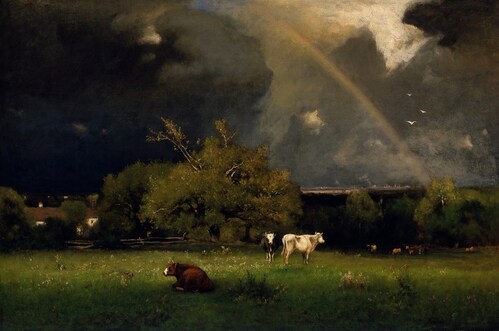Yearning for Shalom

“The Rainbow,” by George Innes, 1879
“Shalom” is the Hebrew word often translated “peace,” but Shalom is a far richer and deeper concept. It includes all aspects of well-being: spiritual, economic, emotional, social, peace with God and man.
In other words, Shalom is the way things ought to be, and we spend our whole lives longing for it and looking for it.
We all long for Shalom all the time.
That’s a pretty broad and unqualified statement, Paul. All of us? All the time?
Yes, the search for Shalom is the underlying storyline in all our lives.
- When we are enjoying the cacophony of all our loved ones together at the same time, we are delighting in a taste of Shalom.
- When politicians bedazzle us with visions of a just and prosperous society, they are pointing toward Shalom and trying to convince us that their policies and leadership will take us there.
- When we see a marriage dissolve, we grieve the loss of Shalom.
Yearning for Shalom even fills our imaginations:
- When we see a movie where the woman is being forced to marry the self-centered jerk, when we long to see her with the good man who loves her, we are longing with her for Shalom.
- And when we see the cliché plotline of the arrogant bully getting his comeuppance, we rejoice that Shalom is being restored.
The search for Shalom is the theme of our stories, our ambitions, our own dreams of the future.
If we all long so deeply for Shalom, why can’t we experience it?
Our problem is that our sin has devastated our lives and cut us off from Shalom. Because of the contamination of sin in our society, in our relationships, in our own hearts – because of the devastating impact that sin has had on our world, Shalom is always out of reach. We can dream of Shalom, but we can never get there.
So these two things are true of all of us: We can’t help but long for Shalom, and we can never find it.
This is why the Gospel is such refreshingly good news: it takes our sin seriously and it provides realistic hope.
1. The Gospel takes our sin seriously.
We don’t need someone to pat us on the head and tell us that we’re not so bad after all. We don’t need a nod and a wink from the Almighty. We know better. We know that our hearts are far too deeply contaminated by sin. We need someone to take our sin for the serious matter that it is.
Jesus understood our dilemma. He came to save us because we could not devise a plan to deal with the corruption in our own hearts; in fact, we had no desire to deal with our inward corruption. Incapable of saving ourselves, we needed a Savior, so Jesus had to come to deliver us.
Jesus took our sin so seriously that He gave up His life to save us. Or, as Tim Keller put it: “We were so broken that Jesus had to die for us, but He loved us so much that He was glad to die for us.”
2. The Gospel provides realistic hope.
The Beatles and the flower children were right: “All we need is love. Love is all we need.” That simplistic refrain is a lovely picture of Shalom.
But as lovely as that vision is, it is not realistic. The problem is not just our sinful behavior, it is also our sin nature, which manifests itself in envy, resentment, back-biting, and rancor. Love is all we need, but thanks to the corruption of the human heart, love is always in short supply, while lust, fear, and anger are ever abundant. That’s why every human effort to achieve Shalom will always be frustrated by the brokenness of the human heart.
This is why only Jesus could open the way to Shalom. Jesus’s sacrifice on our behalf not only paid the debt for our rebellious behavior, He paid to cleanse us of the deeply ingrained sin that made Shalom so far out of reach for us.
That is why we can have realistic hope, a hope that is based not on human ingenuity or effort but on the grace that God has shown us in Christ. And it is a glorious, two-fold hope that God is not only bending the trajectory of our lives toward Shalom (holiness in our hearts and lives) but also that He will ultimately make all things right.
In Jesus, God takes our sin seriously, and He gives us not a fanciful hope based on wishful thinking but a realistic hope based on the self-giving love of Christ.
This means that in Christ, we can taste Shalom now and look forward to experiencing it fully in the Day of His Appearing.
Persevere,
Paul Pyle
Pastor of Discipleship
In other words, Shalom is the way things ought to be, and we spend our whole lives longing for it and looking for it.
We all long for Shalom all the time.
That’s a pretty broad and unqualified statement, Paul. All of us? All the time?
Yes, the search for Shalom is the underlying storyline in all our lives.
- When we are enjoying the cacophony of all our loved ones together at the same time, we are delighting in a taste of Shalom.
- When politicians bedazzle us with visions of a just and prosperous society, they are pointing toward Shalom and trying to convince us that their policies and leadership will take us there.
- When we see a marriage dissolve, we grieve the loss of Shalom.
Yearning for Shalom even fills our imaginations:
- When we see a movie where the woman is being forced to marry the self-centered jerk, when we long to see her with the good man who loves her, we are longing with her for Shalom.
- And when we see the cliché plotline of the arrogant bully getting his comeuppance, we rejoice that Shalom is being restored.
The search for Shalom is the theme of our stories, our ambitions, our own dreams of the future.
If we all long so deeply for Shalom, why can’t we experience it?
Our problem is that our sin has devastated our lives and cut us off from Shalom. Because of the contamination of sin in our society, in our relationships, in our own hearts – because of the devastating impact that sin has had on our world, Shalom is always out of reach. We can dream of Shalom, but we can never get there.
So these two things are true of all of us: We can’t help but long for Shalom, and we can never find it.
This is why the Gospel is such refreshingly good news: it takes our sin seriously and it provides realistic hope.
1. The Gospel takes our sin seriously.
We don’t need someone to pat us on the head and tell us that we’re not so bad after all. We don’t need a nod and a wink from the Almighty. We know better. We know that our hearts are far too deeply contaminated by sin. We need someone to take our sin for the serious matter that it is.
Jesus understood our dilemma. He came to save us because we could not devise a plan to deal with the corruption in our own hearts; in fact, we had no desire to deal with our inward corruption. Incapable of saving ourselves, we needed a Savior, so Jesus had to come to deliver us.
Jesus took our sin so seriously that He gave up His life to save us. Or, as Tim Keller put it: “We were so broken that Jesus had to die for us, but He loved us so much that He was glad to die for us.”
2. The Gospel provides realistic hope.
The Beatles and the flower children were right: “All we need is love. Love is all we need.” That simplistic refrain is a lovely picture of Shalom.
But as lovely as that vision is, it is not realistic. The problem is not just our sinful behavior, it is also our sin nature, which manifests itself in envy, resentment, back-biting, and rancor. Love is all we need, but thanks to the corruption of the human heart, love is always in short supply, while lust, fear, and anger are ever abundant. That’s why every human effort to achieve Shalom will always be frustrated by the brokenness of the human heart.
This is why only Jesus could open the way to Shalom. Jesus’s sacrifice on our behalf not only paid the debt for our rebellious behavior, He paid to cleanse us of the deeply ingrained sin that made Shalom so far out of reach for us.
That is why we can have realistic hope, a hope that is based not on human ingenuity or effort but on the grace that God has shown us in Christ. And it is a glorious, two-fold hope that God is not only bending the trajectory of our lives toward Shalom (holiness in our hearts and lives) but also that He will ultimately make all things right.
In Jesus, God takes our sin seriously, and He gives us not a fanciful hope based on wishful thinking but a realistic hope based on the self-giving love of Christ.
This means that in Christ, we can taste Shalom now and look forward to experiencing it fully in the Day of His Appearing.
Persevere,
Paul Pyle
Pastor of Discipleship
Recent
I Am Moses: How Charlton and Cecil Have Misled Us
February 20th, 2026
The Question Moses Heard
February 13th, 2026
Playing My Part in God’s Long Game: Three Insights
February 6th, 2026
Two Questions That Never Go Away (Part Two)
January 30th, 2026
Two Questions That Never Go Away (Part One)
January 21st, 2026
Archive
2026
January
2025
January
February
March
April
May
July
August
September
October
November
2024
January
February
March
April
May
June
August
September
October
Categories
no categories
